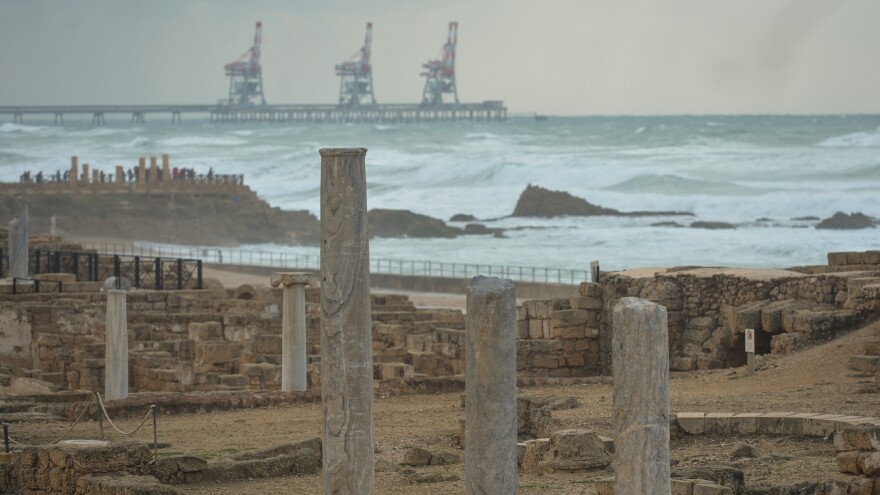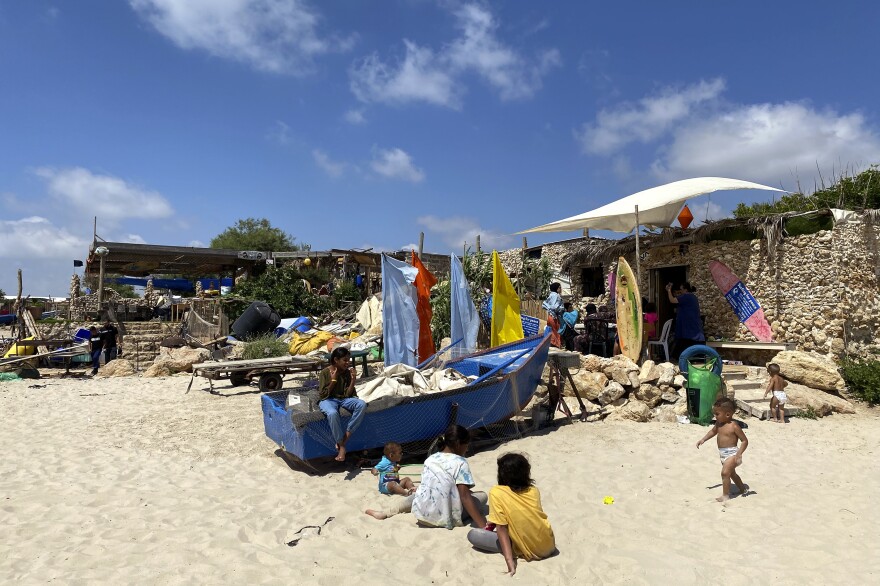Updated July 7, 2021 at 10:01 AM ET
JISR AL-ZARQA, Israel — Entering this coastal village, smooth asphalt gives way to a part-dirt road. Drivers struggle to steer along the bumps and around the pedestrians in cramped streets. Many buildings are unfinished and crumbling.
Jisr al-Zarqa, a fishing village on the Mediterranean Sea, is home to Palestinian citizens of Israel and one of the poorest parts of the country. In a stark contrast, it's hemmed in by Jewish Israeli areas with expensive real estate and popular tourist sites.
But these days, some residents say they hope for a change in the village. Israel's new government includes an Arab political party for the first time — and it promises to invest in Palestinian communities in Israel. That could help a place like Jisr al-Zarqa, where the Mediterranean shines bright but residents say services and opportunity are few.
People feel discriminated against
"We have nothing in this village, nothing," says Dr. Ayyat Rageh, who works at an elite hospital in Tel Aviv but is back in Jisr al-Zarqa for a reunion with childhood friends, who are also doctors. The friends chime in saying the village needs land, buildings, streets, money and jobs.

Residents also complain they lack other basic amenities like a post office, a bank, sidewalks and parking for the village's 15,000 people.
The village was even used as a set for the deeply impoverished Gaza Strip in the Israeli Netflix series, Fauda.
Crime is a concern as well, but the village only received a police station in 2017, with just two police officers, according to the head of Jisr al-Zarqa local council, Murad Ammash.
Palestinian citizens of Israel, also called Arab Israelis, are estimated to make up just over one-fifth of the Israeli population. More than 80% of them believe that most Arab citizens of the country want to integrate within Israeli society, according to a 2020 study by the think tank the Israel Democracy Institute.
Unlike Palestinians living in the Israeli-occupied West Bank and Gaza Strip, Palestinian citizens of Israel are supposed to have the same rights as Jewish Israelis. They can vote, hold office and start businesses, for example.
Yet, many Palestinian Israelis say they are treated as second-class citizens at best.

"People feel neglected and discriminated by the government and they don't think the government can help them in any way," says the local elected leader Ammash.
The village is increasingly hemmed in by Jewish Israeli towns. Human Rights Watch has reported that the Israeli government uses discriminatory land policies that allow Jewish citizens to expand their areas while the policies restrict Arab citizens to smaller, densely populated communities in Israel, like Jisr al-Zarqa.
Unfinished multistory buildings are a sign families have to build up because there's no more land for the growing population.
The predominantly Jewish town next door, Caesarea, put up a raised mound of land topped with trees between it and the Palestinian village. "What you see before you is a racist separation wall," Ammash says, "so they won't see the ugly Jisr."
On the other side, Caesarea has bustling beaches, a golf club and restored remains of an ancient Roman port city that draw tourists. Visitors stroll over stone steps to restaurants, bars and luxury gift shops. Tourism is big business in this part of Israel.

Arabs enter government
Israel held legislative elections in March that resulted in new national leadership after 12 years under Prime Minister Benjamin Netanyahu. In June, lawmakers approved a coalition "government of change" led by Naftali Bennett and including politicians from the right, center and left, as well as Arab parties.
Ammash says the election turnout was low in Jisr al-Zarqa. He says nearly 3,000 people cast votes, about half of them for Mansour Abbas, head of the United Arab List.
Lawmaker Abbas joined the governing coalition and negotiated billions of dollars for development projects for Palestinian citizens in Israel.
Rageh, the Palestinian doctor who works in Tel Aviv, says he voted for Abbas. He sees it as a test: Will it finally make a difference to have an Arab in government? Will it bring much-needed public funding to impoverished Arab towns and neighborhoods in Israel?
"I see a ton of potential"
With government funding, Jisr al-Zarqa could partake in the local tourism economy, according to Heather Heldman, who was an adviser for the U.S. State Department and is now a partner in the Luminae Group for risk assessment in the Middle East.
The village has many things to offer, such as beautiful beaches and fresh seafood.
There is one guest house already receiving tourists. Its owners raised money in a Kickstarter campaign and their clientele has largely been young Israeli backpackers and international guests.
"You have a community that has faced a lot of adversity but found a way to make itself a diamond in the rough by capitalizing on the gifts that it has. I see a ton of potential also — a real potential PR win for the Israeli government — that it needs right now and it ought to be capitalizing on," she says.
At a picnic spot for locals, one of the very few green spaces in the village, Arabic music plays as families and friends eat barbecue and socialize. Ru'a Jorban is there with her partner. He makes ice cream and she's studying chemical engineering at a university outside the village. Both were born and raised in Jisr al-Zarqa.
They both voted in the elections but declined to say whom they voted for.
Jorban hopes the promised development money will reach the village.
"I wish we could use our education to come back and work here and contribute to the economy and help make our city a better place," she says.
But she knows that when she graduates, she says, she'll have to look for opportunities elsewhere.
Copyright 2021 NPR. To see more, visit https://www.npr.org.




